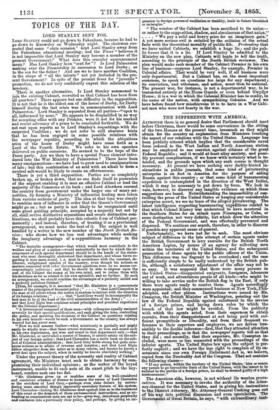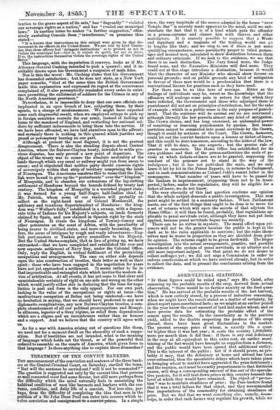THE DIFFERENCE WITH AMERICA.
Aersonsai there is no general desire that Parliament should meet before Christmas, there would be some convenience in the sitting of the two Houses at the present time, inasmuch as they might obtain for the country an explanation from Ministers touching the aspect of our relations with the United States. Language has been publicly uttered-which implies that the considerable naval force ordered to the West Indian and North American station may be employed to use coercion against citizens of the great Federal Republic ; and it would at least allay anxiety, and possi- bly prevent complications, if we knew with certainty what is in- tended, and the grounds upon which any such course is thought necessary. At present we have nothing save darkly-hinted in- sinuations in public journals, that some kind of privateering enterprise is on foot in America for the purpose of aiding:
Russia against this country; or that some kind of buccaneering expedition is contemplated in the direction of the West Indies, which it may be necessary to put down by force. We look in vain, however, to discover any tangible evidence on which these suggestions are based. Notwithstanding the impossibility of con- trolling the press of the United States or keeping any considerable enterprise secret, we see no trace of the alleged privateering. The latest intelligence respecting bucoaneering expeditions related to that which Colonel Kinney was understood to have mustered in the Southern States for an attack upon Nicaragua, or Cuba, or some destination not very definite, but which drew the attention of the Federal Government, and was effectually prevented and dispersed. We continue our search, therefore, in order to discover if possible any apparent cause of quarrel. Unfortunately, we have not far to seek. The most obvious
subject of difference is the late attempt of certain agents under the British Government to levy recruits for the British North American Legion, by means of an agency for collecting men within the territories of the United States, and the subsequent prosecution of those agents by the public officers of the Union. This difference was too flagrant to be overlooked ; and the case is sufficiently simple to be easily understood by the British pub- lic, although a satisfactory adjustment of the affair may not be so easy. It was supposed that there were many persons in the United States—disappointed emigrants, foreigners, labourers out of work, and adventurous people of all kinds—who might be willing to take service under the British flag in the East, if only there were agents ready to receive them. Agents accordingly were appointed; and they commenced business at New York, Phil- adelphia, and other places. Instructions were issued by Mr. Crampton, the British Minister at Washington, pointing out the law of the Federal Republic against enlistment in the service of a foreign prince, and laying down rules by which the breach of that law might be avoided. From the publicity with which the agents acted, from their eagerness to obtain recruits, from their disappointment at not being paid with suf- ficient promptitude or liberality, and from their frequent re- ferences to their superiors and employers, we are driven irre- sistibly to the double inference—first, that they attracted attention to their proceedings, as in fact the newspaper reports tell us that they did ; and secondly, that their superiors, Mr. Crampton in- cluded, were more or less connected with the proceedings of the inferior agents. The United States law upon the subject is per- fectly explicit ; and we have the less right to complain of its en- actments since our own Foreign Enlistment Act is, we believe, copied from the Neutrality Act of the Congress. That act contains the following clause- " If any person, within the territory of the United States, hire or retain any person to go beyond the limit of the United States, with the intent to be enlisted in the service of a foreign prince, he shall be deemed guilty of a high misdemeanour."
The American side, however, is not without its wanton prove- catives. It was necessary to invoke the authority of the Attor- ney-General for the United States, and in giving his instructions to the District Attorney, Mr. Attorney-General Cushing goes out of his way into political discussion and even speculation. The Government of Great Britain, he says, "with extraordinary inat-
tention to the grave aspect of its acts," has "flagrantly" " violated our sovereign rights as a nation," and has "evaded our municipal laws." In another letter he makes "a further .suggestion," offen- sively excluding Consuls from ," interference," on premises thus stated- " It is known that instructions on this subject were given by that Go- vernment to its officers in the United-States. We are told by Lord Claren- don that those officers had stringent instructions ' so to proceed as not to violate the municipal law—that is, to violate its spirit, but not its letter. If so, the instructions themselves violate the sovereign rights of the United States."
This language, with the imputation it conveys, looks as if Mr. Attorney-General Cushing intended to pick a quarrel; and it in- evitably draws upon his Government a suspicion of male fides. Nor is this the worst : Mr. Cushing states that his Government has demanded satisfaction; but he does not state, as a New York paper remarks, "that at the same time the British Government made this explanation and expressed its regret at the occurrences complained of, it also peremptorily rescinded every order in exist- ence permitting the enlistment of soldiers for the Crimea in any of the North American provinces." Nevertheless, it is impossible to deny that our own officials are implicated in an open breach of law, subjecting them, by their agents, to a charge of misdemeanour. We might have expected some such disgraceful result, when we employed crimps to pick up in foreign countries recruits for our army, instead of looking at home to the manhood of England, and rewarding her national sol- diers by sufficient inducements to bring them into the service. If we have been affronted, we have laid ourselves open to the affront; and certainly there is nothing in this quarrel which justifies any proud or peremptory bearing on our part. Although at present the most flagrant, it is not the gravest disagreement. There is also the standing dispute about Central America, where the Bulwer-Clayton treaty, intended to settle pre- vious disputes, has only proved a new point of departure. The object of the treaty was to secure the absolute neutrality of the lands through which any canal or railway might run from ocean to ocean ; and it stipulated that neither party should exercise rights of sovereignty within that strip of territory comprising the lands of Nicaragua. The Americans construe this to mean that the Eng- lish were bound to give up the " protectorate " over the " kingdom" of Mosquitia, and to abandon our extensions of the log-cutting settlement of Honduras beyond the bounds defined by treaty last century. The kingdom of Mosquitia is a wretched puppet state; it was formed for a young half-Negro half-Indian chief, by Mr. Patrick, whom some of our readers will probably re- collect as the right-hand man of Colonel Macdonald, the arbitrary and vexatious Superintendent of Honduras : the king- dom was " Walker's folly," established in a swamp, with a degene- rate tribe of Indians for his Majesty's subjects, on lands formerly claimed by Spain, and now claimed in Spanish right by the state of Nicaragua. It rivals the kingdoms of Tommy-tommy and other potentates on the eoast of Africa, with the peculiarity of being nearer to civilized states, and more easily becoming, there- fore, the scene of intrigues by rough and ready adventurers—Eng- lish port-masters or Yankee privy councillors to his Majesty. Bat the United States complain, that in lieu of giving up, we have encroached—that we have completed and established the new and now separate settlement of Navy Bay, under the Colonial Office. Only, reply the English, in virtual fulfilment of the preexisting occupations and arrangements. The case on either side depends upon the nice construction of treaties, their letter as well as their spirit : those who have been engaged in the negotiation for years have not yet approached a settlement. It seems rather to lie in that impracticable and entangled state which invites the modem de- vice of arbitration. At all events, it has not come to that clear and unmistakeable certainty of right on one aide and wrong on the other which would justify either side in declaring that the time for nego- tiation is past and force is the only appeal. For our own part, looking to the value of the occupations or rights at issue—the usufructuary occupation at Belize not being contested—we have no hesitation in saying, that we should have preferred to any new diplomatic complications, any new Bulwer-Clayton treaties, a com- plete abandonment of all our political preoccupations and Mosqui- to alliances, legacies of a Grey regime, as relief from dependencies which are a stigma and an encumbrance rather than an honour and a support. And we believe that the country will agree with us.
As for a war with America arising out of questions like these, we need not for a moment dwell on the absurdity of such a suppo- sition. But if hostilities are not intended, what is the meaning of language which holds out the threat, or of the powerful fleet ordered to assemble on the -coasts of America, which gives force to that language ? Is there anything else to explain these demarches ?



























 Previous page
Previous page